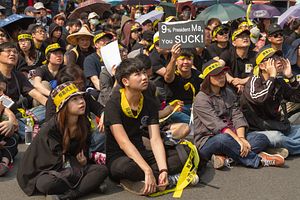The Taiwanese government of President Ma Ying-Jeou last week announced that it had submitted an application to become a founding member of the China-led Asian Infrastructure Investment Bank (AIIB), sparking protests in front of the Presidential Palace over the lack of transparency in the decision-making process and the channel through which the application was submitted.
Taiwan’s government faces a dilemma. Should it push ahead with its application for founding member status and risk political backlash at home, or should it rescind its application and risk regional isolation and losing the benefits that the AIIB could bring? As it stands, both Ma and Taiwan may have more to lose than to gain should its application be successful.
For the current administration, joining the AIIB would be a policy victory. In fact, this may be the last opportunity for the beleaguered Ma to make a push towards closer ties to Beijing before he steps down in 2016, and the move could potentially regain the confidence of the Chinese government, whose support for Ma has been waning. Taiwanese government officials stated that joining the AIIB could bring about better regional integration, raise Taiwan’s international profile, and open the path to greater international participation in the future. In a bid to gain support from the public, the Ministry of Finance told the media that membership in the AIIB could also create investment opportunities for domestic businesses, and increase the exchange of finance professionals and strategies.
In spite of the perceived benefits of joining the AIIB, both diplomatic and economic, political repercussions are imminent. With the recent observing of the first anniversary of the student Sunflower Movement, there is ample suspicion among the public that the government is trying to push through pro-China policies in ways that are less than transparent. Indeed, parallels can be drawn between the “black box” effort to legalize the Cross-Strait Services Trade Agreement a year ago and the sudden and convenient timing of the announcement of the membership application submission. The administration, it seems, learned nothing from the Sunflower Movement. Not only did Ma announce the government’s intent on the day of the application deadline, thus leaving little room for public discourse, he also declared that Taiwan’s application would be submitted via China’s Taiwan Affairs Office. This action implicitly demotes Taiwan’s status to that of a regional government under China’s central government structure, and makes the whole issue even more unpalatable.
There are benefits that come with being a founding member. While all member states have voting power, only the founding states have the ability to establish rules. Moreover, China only plans to have a 15 to 20-member board, and being a founding member would certainly given Taiwan a better chance of winning a seat on the board. There is also the risk that should Taiwan be shut out of the AIIB, it would be sidelined and isolated economically. However, the costs also need to be taken into consideration. First are the political costs, which are already making themselves known. The situation could well devolve into more protests, especially given the similarities with the Sunflower Movement. This would cause instability and greatly diminish the chances of the KMT in the presidential election in 2016, offsetting any political gain that Ma attains through regaining Beijing’s favor.
All things considered, staying on the sidelines for the time being may not be entirely detrimental. It is still unclear what kind of decision-making power, if any, Taiwan would have under a China-led institution, even if it were a founding member. The current ambiguity of the structure and the voting system makes specific benefits uncertain. Moreover, there is little evidence to support the claim that joining the AIIB will lead to more space for international participation in the future, as China is unlikely to abandon its “One China” principle and allow Taiwan to attain membership in other international organizations. After all, Taiwan holds seats in institutions such as the WTO and the Asian Development Bank, yet still finds itself diplomatically constrained.
Given the domestic backlash, it may be to Taiwan’s advantage to sit back and watch the AIIB for a while, before deciding whether participation is worth the political costs. After all, Beijing seems unopposed, and at times even eager, for Taiwan to join the bank, and that stance is unlikely to change. In the meantime, the Taiwanese government could engage in public discourse and show its commitment to the democratic due process. In this sense, Taiwan and Ma may not entirely out of luck if its application to be a founding member is rejected.
Pei-Yu Wei is a graduate student at New York University’s Department of Politics, concentrating in political economy and with a special focus on East Asia.

































